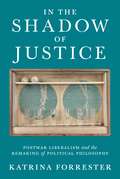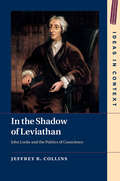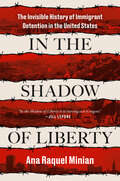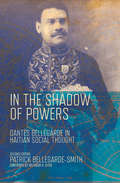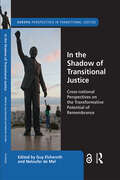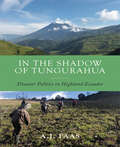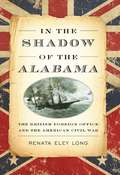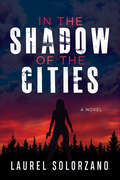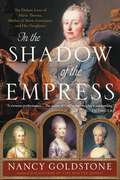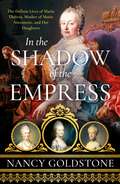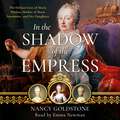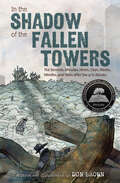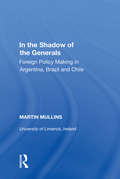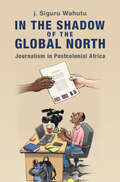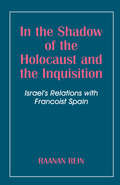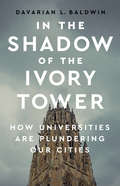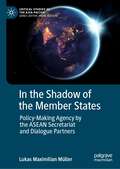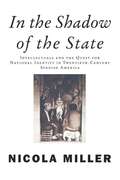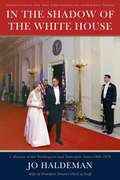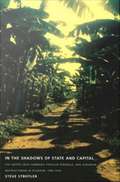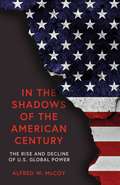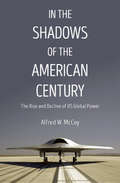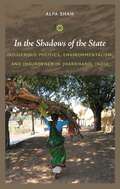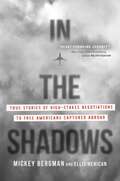- Table View
- List View
In the Shadow of Justice: Postwar Liberalism and the Remaking of Political Philosophy
by Katrina ForresterA history of how political philosophy was recast by the rise of postwar liberalism and irrevocably changed by John Rawls’s A Theory of JusticeIn the Shadow of Justice tells the story of how liberal political philosophy was transformed in the second half of the twentieth century under the influence of John Rawls. In this first-ever history of contemporary liberal theory, Katrina Forrester shows how liberal egalitarianism—a set of ideas about justice, equality, obligation, and the state—became dominant, and traces its emergence from the political and ideological context of the postwar United States and Britain.In the aftermath of the civil rights movement and the Vietnam War, Rawls’s A Theory of Justice made a particular kind of liberalism essential to political philosophy. Using archival sources, Forrester explores the ascent and legacy of this form of liberalism by examining its origins in midcentury debates among American antistatists and British egalitarians. She traces the roots of contemporary theories of justice and inequality, civil disobedience, just war, global and intergenerational justice, and population ethics in the 1960s and ’70s and beyond. In these years, political philosophers extended, developed, and reshaped this liberalism as they responded to challenges and alternatives on the left and right—from the New International Economic Order to the rise of the New Right. These thinkers remade political philosophy in ways that influenced not only their own trajectory but also that of their critics.Recasting the history of late twentieth-century political thought and providing novel interpretations and fresh perspectives on major political philosophers, In the Shadow of Justice offers a rigorous look at liberalism’s ambitions and limits.
In the Shadow of Leviathan: John Locke and the Politics of Conscience (Ideas in Context #127)
by Jeffrey R. CollinsThomas Hobbes and John Locke sit together in the canon of political thought but are rarely treated in common historical accounts. This book narrates their intertwined careers during the Restoration period, when the two men found themselves in close proximity and entangled in many of the same political conflicts. Bringing new source material to bear, In the Shadow of Leviathan establishes the influence of Hobbesian thought over Locke, particularly in relation to the preeminent question of religious toleration. Excavating Hobbes's now forgotten case for a prudent, politique toleration gifted by sovereign power, Jeffrey R. Collins argues that modern, liberal thinking about toleration was transformed by Locke's gradual emancipation from this Hobbesian mode of thought. This book investigates those landmark events - the civil war, Restoration, the popish plot, the Revolution of 1688 - which eventually forced Locke to confront the limits of politique toleration, and to devise an account of religious freedom as an inalienable right.
In the Shadow of Liberty: The Invisible History of Immigrant Detention in the United States
by Ana Raquel MinianA probing work of narrative history that reveals the hidden story of immigrant detention in the United States, deepening urgent national conversations around migration.In 2018, many Americans watched in horror as children were torn from their parents at the US-Mexico border under Trump's "family separation" policy. But as historian Ana Raquel Minian reveals in In the Shadow of Liberty, this was only the latest chapter in a saga tracing back to the 1800s—one in which immigrants to the United States have been held without recourse to their constitutional rights. Braiding together the vivid stories of four migrants seeking to escape the turmoil of their homelands for the promise of America, In the Shadow of Liberty gives this history a human face, telling the dramatic story of a Central American asylum seeker, a Cuban exile, a European war bride, and a Chinese refugee.As we travel alongside these indelible characters, In the Shadow of Liberty explores how sites of rightlessness have evolved, and what their existence has meant for our body politic. Though these "black sites" exist out of view for the average American, their reach extends into all of our lives: the explosive growth of the for-profit prison industry traces its origins to the immigrant detention system, as does the emergence of Guantanamo and the gradual unraveling of the right to bail and the presumption of innocence. Through these narratives, we see how the changing political climate surrounding immigration has played out in individual lives, and at what cost. But as these stories demonstrate, it doesn't have to be like this, and a better way might be possible.
In the Shadow of Powers: Dantes Bellegarde in Haitian Social Thought (Black Lives and Liberation)
by Patrick Bellegarde-SmithOut of a slave rebellion, Haiti was forged as an independent nation. This fact, in and of itself, should have been enough to perpetuate an image of Haitians as strong and agentive people. But leaders of countries on both sides of the Atlantic felt threatened by Haiti's beginnings and were intent on sapping it of resources. More than a century of various restrictions on trade, the imposition of crippling fines, and, eventually, a US occupation followed. Yet even as they suffered economically under these penalties, Haitians persisted, some of them becoming influential actors in the world of global politics.Throughout much of the twentieth century and even to this day, there has been a dearth of scholarship on the intellectual and political contributions of Haitians. In the Shadow of Powers, first published in 1985, was a corrective to this oversight and remains a foundational text. Bellegarde-Smith traces the history of Haiti through the life and career of his grandfather Dantès Bellegarde, one of Haiti's influential diplomats and preeminent thinkers. As Brandon R. Byrd describes in his foreword to this new edition, "Bellegarde was driven by a subversive, racially inclusive vision of civilized progress. He believed in and continued to push for Haiti to establish an existence for itself, black people, and the colonized world independent of the considerable shadow cast by the world's military, economic, and industrial powers." Scholars and students who want to learn about the intellectual and political foundations of Haiti, its influence on other intellectuals worldwide, and its struggles against imperialism continue to find this to be an invaluable classic.
In the Shadow of Powers: Dantes Bellegarde in Haitian Social Thought (Black Lives and Liberation)
by Patrick Bellegarde-SmithOut of a slave rebellion, Haiti was forged as an independent nation. This fact, in and of itself, should have been enough to perpetuate an image of Haitians as strong and agentive people. But leaders of countries on both sides of the Atlantic felt threatened by Haiti's beginnings and were intent on sapping it of resources. More than a century of various restrictions on trade, the imposition of crippling fines, and, eventually, a US occupation followed. Yet even as they suffered economically under these penalties, Haitians persisted, some of them becoming influential actors in the world of global politics. Throughout much of the twentieth century and even to this day, there has been a dearth of scholarship on the intellectual and political contributions of Haitians. In the Shadow of Powers, first published in 1985, was a corrective to this oversight and remains a foundational text. Bellegarde-Smith traces the history of Haiti through the life and career of his grandfather Dantès Bellegarde, one of Haiti's influential diplomats and preeminent thinkers. As Brandon R. Byrd describes in his foreword to this new edition, "Bellegarde was driven by a subversive, racially inclusive vision of civilized progress. He believed in and continued to push for Haiti to establish an existence for itself, black people, and the colonized world independent of the considerable shadow cast by the world's military, economic, and industrial powers." Scholars and students who want to learn about the intellectual and political foundations of Haiti, its influence on other intellectuals worldwide, and its struggles against imperialism continue to find this to be an invaluable classic.
In the Shadow of Transitional Justice: Cross-national Perspectives on the Transformative Potential of Remembrance (Europa Perspectives in Transitional Justice)
by Guy ElcherothThis volume bridges two different research fields and the current debates within them. On the one hand, the transitional justice literature has been shaken by powerful calls to make the doctrine and practice of justice more transformative. On the other hand, collective memory studies now tend to look more closely at meaningful silences to make sense of what nations leave out when they remember their pasts. The book extends the scope of this heuristic approach to the different mechanisms that come under the umbrella of transitional justice, including legal prosecution, truth-seeking and reparations, alongside memorialisation. The 15 chapters included in the volume, written by expert scholars from diverse disciplinary and societal backgrounds, explore a range of practices intended to deal with the past, and how making the invisible visible again can make transitional justice - or indeed, any societal engagement with the past - more transformative. Seeking to combine contextual depth and comparative width, the book features two key case analyses - South Africa and Sri Lanka - alongside discussions of multiple cases, including such emblematic sites as Rwanda and Argentina, but also sites better known for resisting than for embracing international norms of transitional justice, such as Turkey or Côte d’Ivoire. The different contributions, grouped in themed sections, progressively explore the issues, actors and resources that are typically forgotten when societies celebrate their pasts rather than mourning their losses and, in doing so, open new possibilities to build more inclusive processes for addressing the present consequences of past injustice.
In the Shadow of Tungurahua: Disaster Politics in Highland Ecuador
by A.J. FaasIn the Shadow of Tungurahua relates the stories of the people of Penipe, Ecuador living in and between several villages around the volcano Tungurahua and two resettlement communities built for people displaced by government operations following volcanic eruptions in 1999 and 2006. The stories take shape in ways that influence prevailing ideas about how disasters are produced and reproduced, in this case by shifting assemblages of the state first formed during Spanish colonialism attempting to settle (make “legible”) and govern Indigenous and campesino populations and places. The disasters unfolding around Tungurahua at the turn of the 21st century also provide lessons in the humanitarian politics of disaster—questions of deservingness, reproducing inequality, and the reproduction of bare life. But this is also a story of how people responded to confront hardships and craft new futures, about forms of cooperation to cope with and adapt to disaster, and the potential for locally derived disaster recovery projects and politics.
In the Shadow of the Alabama
by Renata Eley LongThis book looks at an allegation of betrayal made against a young Foreign Office clerk, Victor Buckley, who, it was claimed, leaked privileged information to agents of the Southern States during the American Civil War. As a consequence, the CSS Alabama narrowly escaped seizure by the British Government and proceeded to wage war on American shipping. Victor Buckley’s background is examined against the hitherto erroneous belief that he was an insignificant member of the Foreign Office staff. The American minister Charles Francis Adams oversees a network of spies endeavoring to prove contravention of The Foreign Enlistment Act. The South’s agents, Captain James D. Bulloch and Major Caleb Huse, are the prime targets, and a battle of wits ensues as Bulloch oversees construction of his ships on Merseyside. A member of a prominent City family offers to enlist the help of a relative who, he claims, holds a confidential position in the Foreign Office. The Confederate agents are soon receiving information about the status of Anglo-American diplomacy and are able to outwit the Union spies and dispatch arms and supplies to the South. Their coup d'état is achieved with the arrival of a message that hurries the Confederate’s most formidable warship out of British waters. After the escape of the Alabama, the Government moves to curtail Bulloch’s operations. When the war ends in 1865, investigations begin into the circumstances surrounding the Alabama’s departure. As America demands reparation, evidence apparently incriminating Victor Buckley is acquired, but before the claim reaches its hearing in Geneva, diplomatic moves (some involving Anglo-American Masonic influence) result in a treaty and ensure that no allegation is made against any individual member of Foreign Office staff. Queen Victoria, anxious to see the Alabama Claims settled, is spared embarrassment. A scandal erupts in the Foreign Office in 1878 as a freelance clerk, Charles Marvin, leaks sensitive information to the press and subsequently writes of his experiences, revealing much of the ethos of the office pertinent to Buckley’s story. The writer Arthur Conan Doyle becomes fascinated by Anglo-American diplomacy and the Alabama question, and, soon after joining a London gentlemen’s club where Buckley’s alleged contact is a member, writes a Sherlock Holmes story involving a Foreign Office clerk’s apparent betrayal. For historians, it is important to know that the book explores the mindset of the Foreign Office during the American Civil War and prior to the Geneva Arbitration in greater depth than has been achieved before. It addresses previously unsolved mysteries that have puzzled historians for over 150 years and reveals the truth behind the success of Confederate naval activities in Britain. Consequently, it challenges some of the perceived views of the events that have been repeated in successive generations of books on the subject. For the general reader, it should be shown that the book provides an insight into nineteenth century Anglo-American politics, the subtleties of the British class system, and the fragile relationship between Britain and the United States at that time, each still conscious of their fractured past. In solving the stubbornly elusive mysteries surrounding the infamous CSS Alabama it shows how close Britain and America came to war, and how the resolution gave rise to the 'Special Relationship. ’
In the Shadow of the Cities: A Novel
by Laurel SolorzanoA woman guard learns that the government is not her friend in this young adult dystopian thriller from the author of The Final Olympics. Scarlett would never kill her best friend, perhaps a Citizen if the situation called for it, but never Rhys. There are quite a few rules in the training center, but a few are the kind that are never broken. Greens are not sent into Cities without officially being promoted to Blue. Blues don&’t kill each other. So why is Scarlett being sent into a City without the proper training? And why does a bizarre, elderly male say Scarlett will kill Rhys? In the Shadow of the Cities details Scarlett&’s life in the training center before she is pulled unexpectedly into City life. Without the proper training, she is confused about these things called &“families&” and why the Citizens aren&’t grateful that she is keeping them safe. In this dystopian novel, In the Shadow of the Cities, the story is told not from a Citizen&’s point of view but from a Guard&’s. Why do the guards seem to tirelessly obey the government? How can they gun down Citizens mercilessly? Find out as you follow Scarlett on her journey into the Cities.
In the Shadow of the Empress: The Defiant Lives of Maria Theresa, Mother of Marie Antoinette, and Her Daughters
by Nancy GoldstoneThe vibrant, sprawling saga of Empress Maria Theresa—one of the most renowned women rulers in history—and three of her extraordinary daughters, including Marie Antoinette, the doomed queen of France.Out of the thrilling and tempestuous eighteenth century comes the sweeping family saga of beautiful Maria Theresa, a sovereign of uncommon strength and vision, the only woman ever to inherit and rule the vast Habsburg Empire in her own name, and three of her remarkable daughters: lovely, talented Maria Christina, governor-general of the Austrian Netherlands; spirited Maria Carolina, the resolute queen of Naples; and the youngest, Marie Antoinette, the glamorous, tragic queen of France, and perhaps the most famous princess in history. Unfolding against an irresistible backdrop of brilliant courts from Vienna to Versailles, embracing the exotic lure of Naples and Sicily, this epic history of Maria Theresa and her daughters is a tour de force of desire, adventure, ambition, treachery, sorrow, and glory. Each of these women&’s lives was packed with passion and heart-stopping suspense. Maria Theresa inherited her father&’s thrones at the age of twenty-three and was immediately attacked on all sides by foreign powers confident that a woman would to be too weak to defend herself. Maria Christina, a gifted artist who alone among her sisters succeeded in marrying for love, would face the same dangers that destroyed the monarchy in France. Resourceful Maria Carolina would usher in the golden age of Naples only to face the deadly whirlwind of Napoleon. And, finally, Marie Antoinette, the doomed queen whose stylish excesses and captivating notoriety have masked the truth about her husband and herself for two hundred and fifty years. Vividly written and deeply researched, In the Shadow of the Empress is the riveting story of four exceptional women who changed the course of history.
In the Shadow of the Empress: The Defiant Lives of Maria Theresa, Mother of Marie Antoinette, and Her Daughters
by Nancy GoldstoneOut of the thrilling and tempestuous eighteenth century comes the sweeping family saga of beautiful Maria Theresa, a sovereign of extraordinary strength and vision, the only woman ever to inherit and rule the vast Habsburg empire in her own name, and three of her remarkable daughters: lovely, talented Maria Christina, governor-general of the Austrian Netherlands; spirited Maria Carolina, the resolute queen of Naples; and the youngest, Marie Antoinette, the glamorous, tragic queen of France, perhaps the most famous princess in history. Unfolding against an irresistible backdrop of brilliant courts from Vienna to Versailles, embracing the exotic lure of Naples and Sicily, this epic history of Maria Theresa and her daughters is a tour de force of desire, adventure, ambition, treachery, sorrow, and glory.Each of these women's lives was packed with passion and heart-stopping suspense. Maria Theresa inherited her father's thrones at the age of twenty-three and was immediately attacked on all sides by foreign powers confident that a woman would to be too weak to defend herself. Maria Christina, a gifted artist, who alone among her sisters succeeded in marrying for love, would face the same dangers that destroyed the monarchy in France. Resourceful Maria Carolina would usher in the golden age of Naples only to then face the deadly whirlwind of Napoleon. And, finally, Marie Antoinette, the doomed queen whose stylish excesses and captivating notoriety have masked the truth about her husband and herself for two hundred and fifty years.
In the Shadow of the Empress: The Defiant Lives of Maria Theresa, Mother of Marie Antoinette, and Her Daughters
by Nancy GoldstoneOut of the thrilling and tempestuous eighteenth century comes the sweeping family saga of beautiful Maria Theresa, a sovereign of extraordinary strength and vision, the only woman ever to inherit and rule the vast Habsburg empire in her own name, and three of her remarkable daughters: lovely, talented Maria Christina, governor-general of the Austrian Netherlands; spirited Maria Carolina, the resolute queen of Naples; and the youngest, Marie Antoinette, the glamorous, tragic queen of France, perhaps the most famous princess in history. Unfolding against an irresistible backdrop of brilliant courts from Vienna to Versailles, embracing the exotic lure of Naples and Sicily, this epic history of Maria Theresa and her daughters is a tour de force of desire, adventure, ambition, treachery, sorrow, and glory.Each of these women's lives was packed with passion and heart-stopping suspense. Maria Theresa inherited her father's thrones at the age of twenty-three and was immediately attacked on all sides by foreign powers confident that a woman would to be too weak to defend herself. Maria Christina, a gifted artist, who alone among her sisters succeeded in marrying for love, would face the same dangers that destroyed the monarchy in France. Resourceful Maria Carolina would usher in the golden age of Naples only to then face the deadly whirlwind of Napoleon. And, finally, Marie Antoinette, the doomed queen whose stylish excesses and captivating notoriety have masked the truth about her husband and herself for two hundred and fifty years.
In the Shadow of the Fallen Towers: The Seconds, Minutes, Hours, Days, Weeks, Months, and Years after the 9/11 Attacks
by Don BrownExcellence in Nonfiction for Young Adults FinalistA graphic novel chronicling the immediate aftermath and rippling effects of one of the most impactful days in modern history: September 11, 2001. From the Sibert Honor– and YALSA Award–winning creator behind The Unwanted and Drowned City. The consequences of the terrorist attack on the World Trade Center in New York City, both political and personal, were vast, and continue to reverberate today. Don Brown brings his journalistic eye and attention to moving individual stories to help teens contextualize what they already know about the day, as well as broaden their understanding of the chain of events that occurred in the attack’s wake.Profound, troubling, and deeply moving, In the Shadow of the Fallen Towers bears witness to our history—and the ways it shapes our future.
In the Shadow of the Generals: Foreign Policy Making in Argentina, Brazil and Chile
by Martin MullinsProviding an in-depth study of the construction of foreign policy in developing countries, Martin Mullins takes an original line of both a post-positivist methodology and an acceptance of the importance of the realism in foreign policy formation in the Southern Cone countries from the early 1980s to the present day. This carefully constructed work highlights the case of Chilean foreign policy in the 1990s in order to examine the adoption of realism in its policy formation, in contrast to the strong historical narratives of Argentina and Brazil. The volume focuses on the nuances of foreign policy making through a comprehensive study of political culture that underlines the links between domestic and foreign policy sets in the region.
In the Shadow of the Global North: Journalism in Postcolonial Africa (Communication, Society and Politics)
by j. Siguru WahutuIn the Shadow of the Global North unpacks the historical, cultural, and institutional forces that organize and circulate journalistic narratives in Africa to show that something complex is unfolding in the postcolonial context of global journalistic landscapes, especially the relationships between cosmopolitan and national journalistic fields. Departing from the typical discourse about journalistic depictions of Africa, j. Siguru Wahutu turns our focus to the underexplored journalistic representations created by African journalists reporting on African countries. In assessing news narratives and the social context within which journalists construct these narratives, Wahutu captures not only the marginalization of African narratives by African journalists but opens up an important conversation about what it means to be an African journalist, an African news organization, and African in the postcolony.
In the Shadow of the Holocaust and the Inquisition: Israel's Relations with Francoist Spain
by Raanan ReinThis is an analysis of the reasons for the failure of all efforts to establish diplomatic relations between Israel and Francoist Spain from the late 1940s to the mid-1970s. It uncovers the political discussions and the diplomatic moves of each country.
In the Shadow of the Ivory Tower: How Universities Are Plundering Our Cities
by Davarian L BaldwinAcross America, universities have become big businesses—and our cities their company towns. But there is a cost to those who live in their shadow. Urban universities play an outsized role in America&’s cities. They bring diverse ideas and people together and they generate new innovations. But they also gentrify neighborhoods and exacerbate housing inequality in an effort to enrich their campuses and attract students. They maintain private police forces that target the Black and Latinx neighborhoods nearby. They become the primary employers, dictating labor practices and suppressing wages. In the Shadow of the Ivory Tower takes readers from Hartford to Chicago and from Phoenix to Manhattan, revealing the increasingly parasitic relationship between universities and our cities. Through eye-opening conversations with city leaders, low-wage workers tending to students&’ needs, and local activists fighting encroachment, scholar Davarian L. Baldwin makes clear who benefits from unchecked university power—and who is made vulnerable. In the Shadow of the Ivory Tower is a wake-up call to the reality that higher education is no longer the ubiquitous public good it was once thought to be. But as Baldwin shows, there is an alternative vision for urban life, one that necessitates a more equitable relationship between our cities and our universities.
In the Shadow of the Member States: Policy-Making Agency by the ASEAN Secretariat and Dialogue Partners (Critical Studies of the Asia-Pacific)
by Lukas Maximilian MüllerThis book provides practice-oriented insights into the agency of two previously underestimated actors in Southeast Asian regionalism: the ASEAN Secretariat and ASEAN’s dialog partners. In doing so, it offers an inside view of the policymaking processes in the ASEAN Political-Security and the ASEAN Economic Community, analyzing the interplay and agency by both actors in agenda setting, formulation, decision-making, implementation, and monitoring. Drawing on a trove of novel data, including never-before analyzed sources and numerous interviews with ASEAN insiders, the book showcases a number of concrete cases of policymaking, including competition and counterterrorism policies. The chapters focusing on the ASEAN Secretariat address aspects related to institutional autonomy, capacity, and reforms within the bureaucracy. In the chapters on ASEAN's dialog partners, the book provides insights into the bilateral management of institutional support programs, as well as the impacts of support on ASEAN's policymaking processes.
In the Shadow of the State: Intellectuals and the Quest for National Identity in Twentieth-century Spanish America
by Nicola MillerCarlos Fuentes once observed that to be a Spanish American intellectual was to fulfill the roles, by default, of “a tribune, a member of parliament, a labor leader, a journalist, a redeemer of his society.” Such statements reflect the view that the region’s intellectuals have often acted as substitutes for the structures of a civil society. An alternative view casts Spanish American intellectuals in a far more reactionary role. Here, it is suggested that the elaboration of inert popular stereotypes such as the stoic Indian and the heroic gaucho has resulted in an infinite postponement of authentic cultural identity, and a perpetuation, aided by intellectuals, of a social order in which popular demands were either ignored or repressed. In the context of this debate, this book explores the roles played by intellectuals in the creation of popular national identities in twentieth-century Spanish America, and seeks to identify the factors which lie behind two such contrasting evaluations of their contribution. Ranging across the intellectual centers of Argentina, Chile, Cuba, Mexico and Peru, it illustrates vividly the diversity and evolution of intellectual life in the region. Particular attention is paid to the idea of peripheral modernity and its influence on intellectual activity, as well as to the contributions made by intellectuals to the three major strands in debates on popular national identity: bi-culturalism, anti-imperialism and history.
In the Shadow of the White House: A Memoir of the Washington and Watergate Years 1968-1978
by Jo HaldemanFor her first forty years, Jo Haldeman's life followed a conventional path. While her husband, Bob, built his career in advertising, Jo comfortably settled into her role as mother of four, housewife, and community volunteer. In 1968, Jo's world changed dramatically. Richard Nixon was elected President of the United States, and Bob was offered the job of a lifetime--White House Chief of Staff. As Jo and Bob discussed the opportunities and challenges that this move would entail, little did she anticipate the course that her life, and her relationship with Bob, would take over the next ten years. In this insightful, poignant, and guileless memoir of those ten years, Jo shares her story as the wife of H. R. Haldeman, often referred to as the second most powerful person in the White House. She offers a window into the world of trips on Air Force One, weekends at Camp David, and events at the White House, as well as family vignettes and the growing stresses of her husband's demanding job. Then a bungled burglary at the Watergate erupted into a national scandal. The news began to feature the Haldeman name. Blaring headlines and vicious political cartoons accompanied new revelations of a cover-up. Multiple investigations and Senate hearings followed. Criminal proceedings loomed. Jo's compelling account takes the reader on her journey from the heady heights of Washington life through an excruciating public resignation and trial to her husband's conviction and imprisonment. In a true period piece, Jo illuminates the story of the "woman behind the man" and personalizes the Watergate experience. Enhanced by her personal photographs and the immediacy of her present tense delivery, In the Shadow of the White House is a fascinating work of nonfiction that reads like a novel. Jo Haldeman was married to H. R. "Bob" Haldeman, Richard Nixon's Chief of Staff, for forty-four years. She lives in Santa Barbara, California, and has four children and six grandchildren.
In the Shadows of State and Capital: The United Fruit Company, Popular Struggle, and Agrarian Restructuring in Ecuador, 1900-1995
by Steve StrifflerWinner of the 2001 President's Award of the Social Science History Association In the Shadows of State and Capital tells the story of how Ecuadorian peasants gained, and then lost, control of the banana industry. Providing an ethnographic history of the emergence of subcontracting within Latin American agriculture and of the central role played by class conflict in this process, Steve Striffler looks at the quintessential form of twentieth-century U. S. imperialism in the region--the banana industry and, in particular, the United Fruit Company (Chiquita). He argues that, even within this highly stratified industry, popular struggle has contributed greatly to processes of capitalist transformation and historical change. Striffler traces the entrance of United Fruit into Ecuador during the 1930s, its worker-induced departure in the 1960s, the troubled process through which contract farming emerged during the last half of the twentieth century, and the continuing struggles of those involved. To explore the influence of both peasant activism and state power on the withdrawal of multinational corporations from banana production, Striffler draws on state and popular archives, United Fruit documents, and extensive oral testimony from workers, peasants, political activists, plantation owners, United Fruit administrators, and state bureaucrats. Through an innovative melding of history and anthropology, he demonstrates that, although peasant-workers helped dismantle the foreign-owned plantation, they were unable to determine the broad contours through which the subsequent system of production--contract farming--emerged and transformed agrarian landscapes throughout Latin America. By revealing the banana industry's impact on processes of state formation in Latin America, In the Shadows of State and Capital will interest historians, anthropologists, and political scientists, as well as scholars of globalization and agrarian studies.
In the Shadows of the American Century: The Rise and Decline of US Global Power
by Alfred W. McCoyFor a decade America&’s share of the global economy has been in decline. Its diplomatic alliances are under immense strain, and any claim of moral leadership has been abandoned. America is still a colossus, possessing half the world&’s manufacturing capacity, nearly half its military forces, and a formidable system of global surveillance and covert operations. But even at its peak it may have been sowing the seeds of its own destruction. Is it realistic to rely on the global order established after World War II, or are we witnessing the changing of the guard, with China emerging as the world&’s economic and military powerhouse? America clings to its superpower status, but for how much longer?
In the Shadows of the American Century: The Rise and Decline of US Global Power (Dispatch Books)
by Alfred W. McCoyThe award-winning historian delivers a &“brilliant and deeply informed&” analysis of American power from the Spanish-American War to the Trump Administration (New York Journal of Books).In this sweeping and incisive history of US foreign relations, historian Alfred McCoy explores America&’s rise as a world power from the 1890s through the Cold War, and its bid to extend its hegemony deep into the twenty-first century. Since American dominance reached its apex at the close of the Cold War, the nation has met new challenges that it is increasingly unequipped to handle.From the disastrous invasion of Iraq to the failure of the Trans-Pacific Partnership, fracturing military alliances, and the blundering nationalism of Donald Trump, McCoy traces US decline in the face of rising powers such as China. He also offers a critique of America&’s attempt to maintain its position through cyberwar, covert intervention, client elites, psychological torture, and worldwide surveillance.
In the Shadows of the State: Indigenous Politics, Environmentalism, and Insurgency in Jharkhand, India
by Alpa ShahIn the Shadows of the State suggests that well-meaning indigenous rights and development claims and interventions may misrepresent and hurt the very people they intend to help. It is a powerful critique based on extensive ethnographic research in Jharkhand, a state in eastern India officially created in 2000. While the realization of an independent Jharkhand was the culmination of many years of local, regional, and transnational activism for the rights of the region's culturally autonomous indigenous people, Alpa Shah argues that the activism unintentionally further marginalized the region's poorest people. Drawing on a decade of ethnographic research in Jharkhand, she follows the everyday lives of some of the poorest villagers as they chase away protected wild elephants, try to cut down the forests they allegedly live in harmony with, maintain a healthy skepticism about the revival of the indigenous governance system, and seek to avoid the initial spread of an armed revolution of Maoist guerrillas who claim to represent them. Juxtaposing these experiences with the accounts of the village elites and the rhetoric of the urban indigenous-rights activists, Shah reveals a class dimension to the indigenous-rights movement, one easily lost in the cultural-based identity politics that the movement produces. In the Shadows of the State brings together ethnographic and theoretical analyses to show that the local use of global discourses of indigeneity often reinforces a class system that harms the poorest people.
In the Shadows: True Stories of High-Stakes Negotiations to Free Americans Captured Abroad
by Ellis Henican Mickey BergmanA top negotiator in countless high-stakes missions to free Americans captured abroad and held in the world's scariest prisons takes readers inside the dramatic and shadowy world of international hostage rescue. Brittney Griner, Danny Fenster, Otto Warmbier, Trevor Reed, Paul Whelan, Kenneth Bae…When an American citizen is unjustly imprisoned overseas, that&’s when Mickey Bergman&’s phone starts to ring. Who else are their desperate loved ones supposed to call? Mickey and his tight team of savvy negotiators at the Richardson Center for Global Engagement are the go-to rescuers of last resort, carrying on the high-stakes, round-the-world mission of master negotiator Bill Richardson. Mickey and his team do what U.S. government officials are often unable or unwilling to do: sit down with America&’s toughest adversaries and find creative ways to bring our people home. That's life In the Shadows. This is the heart-pounding story of these urgent negotiations, what it&’s like to climb inside the minds of some of the world&’s most notorious strongmen, where the clear divisions between good and evil are replaced by a thousand shades of gray. The hard work is done far from the glare of media publicity. The negotiations don&’t follow traditional diplomatic rules. As innocent Americans sit behind bars in hellhole foreign prisons, Mickey and his colleagues stop at nothing to get our people home. And these cases almost never go as smoothly as they should, as the independent negotiators navigate between U.S. government officials and some of the world&’s most headstrong leaders. And as soon as one American is freed, Mickey is off on another dicey mission to Moscow, Caracas, Naypyidaw, Pyongyang, or some other complex foreign capital. These painstaking campaigns require creative thinking, hardball pressure tactics, excruciating patience, and a genuine sense of compassion for the anxious families whose lives are thrown into turmoil when a loved one is imprisoned abroad. In Mickey Bergman's own words, In the Shadows tells the hidden story of these high-drama rescue campaigns. The crafty negotiating strategies. The strong-willed foreign leaders. The emotional rollercoaster of being responsible for innocent American lives. The exhilaration when another American is released from a foreign prison—and the terrible letdown when a promising effort hits another maddening roadblock. Mickey recounts his unique relationship with his mentor, the late, great Richardson, the former governor of New Mexico, ambassador to the United Nations and legendary negotiator. He shares the wrenching closeness he develops with the desperate families he serves, who often have nowhere else to turn. He offers a detailed account of his one-on-one interactions with Washington&’s top power players, both Democrats and Republicans, and some of the world&’s most isolated and misunderstood heads of state. For readers who want the full, searing story of these life-or-death rescue missions and the fascinating people behind them, it&’s all In the Shadows. As Mickey Bergman and New York Times bestselling author Ellis Henican make clear on every page, international diplomacy isn&’t just for government officials anymore.
